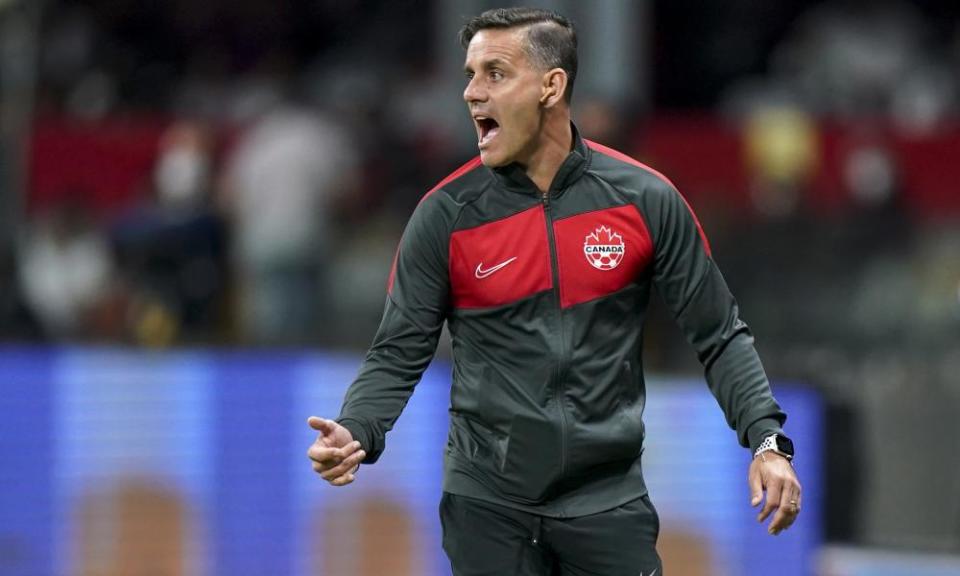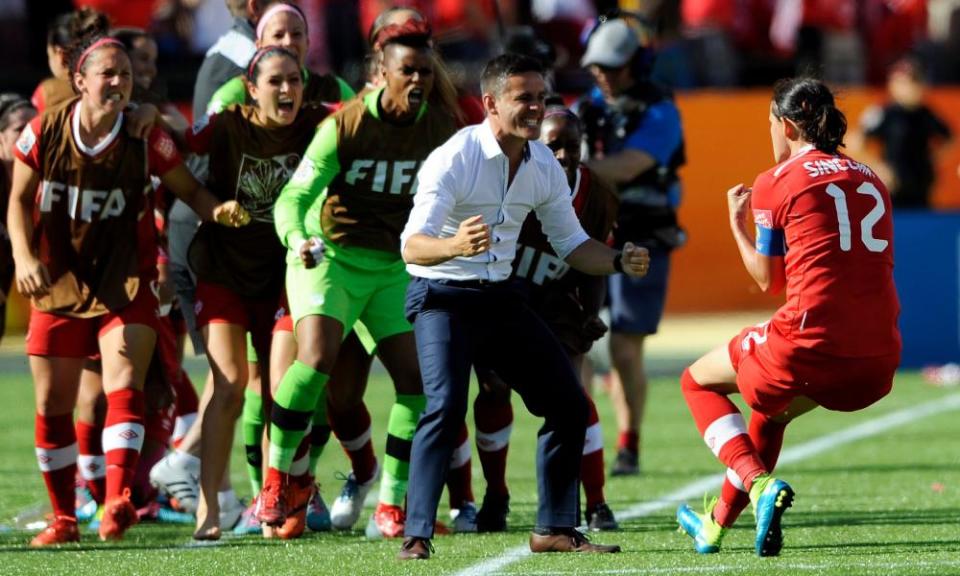John Herdman: the mastermind who has led Canada to the men’s and women’s World Cups

John Herdman stands in front of a yellow conference room wall, shifting his weight from one foot to the other, off to the side of a projector screen. It displays a quote from Sun Tzu in one corner and a dramatic description of a wildfire along the bottom. He leans into the latter.
“It gains a terrifying momentum. That’s what it gains – a terrifying momentum. This red shirt, this team,” the Canada manager tells his players. “It consumes everything in its path: Bermuda, Cayman Islands, Aruba, Suriname … and then you’ll be ready. What a fucking journey.”
If the identities of the four teams in that path somewhat detract from the speech, they really shouldn’t. This is the world that Canada’s men’s national team were operating in just a year and a half ago. Next week Herdman, an Englishman who has become a hero in Canada, will send his team out to face Belgium in the country’s first men’s World Cup match for nearly four decades.
The speech is one of the first stirring moments from WeCAN, a behind-the-scenes series charting Canada’s rollicking run through Concacaf qualifying en route to Qatar. There are plenty more. But in truth, this is all merely part of the journey.
Just one Canadian player was born before Mexico 86, the last time the country played on the game’s grandest stage – indomitable skipper Atiba Hutchinson who turns 40 in February. Much is rightly made of the rawness and inexperience of the team he captains. But Herdman, the 47-year-old former teacher from Durham, does not lack for experience. Qatar, remarkably, will be the fourth senior World Cup of a management career that started in earnest 16 years ago.
Herdman talks about history as something to be torn up or rewritten, to be challenged or made and remade. When asked last week what it meant to him to be the first manager ever to take a team to a men’s and women’s World Cup, he spoke of how pivotal it is to be “practicing what I preach”.
The preaching is, and appears to have always been, the key part of Herdman’s practice. Spend time with any of those who he’s brought with him on his journey from skills camps in northern England and doubters at the Sunderland Academy to grassroots roles in New Zealand that turned to national team jobs there and in Canada, and the talk always comes back to the talk. Herdman is a master of motivation.
“John is built for these kind of tournaments,” says Melissa Tancredi, the former Canadian stalwart who played under Herdman at the 2015 Women’s World Cup. “He’s been through it all. He’s been through one at home [in Canada] when we all felt that pressure so I don’t think that there’s any inexperience with John.
Related: World Cup 2022 team guides part 22: Canada
“This man has something that most managers don’t and that’s his ability to actually connect with players and get the absolute best out of them. He’s a mastermind. I’ve never had, or heard of, a coach who is able to connect with players like he does. He’s an absolute beauty in terms of a motivator. He has that ability to calm the situation or bring it to where he needs to bring it, he’s a calibrator. You don’t really learn that, it’s something you’re innately given.”
While Herdman has undoubtedly grown as a tactician during his years in the international game, Tancredi’s argument that the psychological and cultural skills were a feature from the jump is backed up by those who were there at the start.
Wendi Henderson was long since retired from the New Zealand national team and was feeling her way back into club football, initially for fun, in 2006 when someone approached her on the sidelines in Wellington.
“It was John Herdman. He said he’d just been appointed as Football Ferns manager and asked: ‘Where are you at?’” Henderson says. “I started laughing. ‘Where am I at? I’m 35 and retired three years ago!’”

Henderson would soon be on a plane to China for a two-match tour, Herdman handing her the captain’s armband for both. She’d retired on 48 caps but now rang up her half century as a new era dawned under a manager four years her junior.
“He and I used to laugh about the age difference,” adds Henderson. “But he had a way of really connecting with people and drawing them in to the journey. He has done that with every team he has coached and you can see it. You can see the goosebumps. It instantly takes me back to those moments, making us want to die for each other and die for our country.”
Henderson led the line at Herdman’s first World Cup, the 2007 women’s edition where he set up his side to contain their opponents. By the time the 2011 tournament rolled around, the journey had progressed and Henderson watched a more expansive Ferns side. Herdman’s motivational skillset was being sharpened too. Defender Kirsty Hill, on the 2011 team, shared with Herdman a Maori saying that he has often come back to: “You have to touch someone’s heart before you can take them by the hand.”
New Zealand had touched the Herdman family. His son Jay now represents their U-19s. But there was a new calling. Canadian hearts were barely beating when Herdman arrived in the country in 2011. Canada had been the worst performer at that year’s Women’s World Cup.
“We were completely broken,” recalls retired defender Emily Zurrer, who was also part of that 2015 squad. “Some of us were thinking about hanging up our boots and here’s this guy talking about being on a podium and seeing our flag rise … and very quickly he instilled that belief in us. It wasn’t this false sense of belief, it was: ‘Holy shit we can actually do something here with this guy leading our way’. He’s not just talk, he’s the hardest working person I’ve met in my life.”
Herdman guided the women to back-to-back Olympic bronzes before they went two better at Tokyo last year. It’s therefore understandably hard to find dissenting voices, anyone left unmotivated by all the talk. Would his earnestness have such a runway in the more cynical confines of his homeland? We may one day find out. Herdman is a demanding leader but surrounds himself with a staff who know the drill. One minor criticism is that he perhaps wants to be liked too much and delays hard conversations. His jump from the women to the men in 2018 was hugely controversial and Herdman has admitted regret about how it was handled, particularly a hurried apology to veteran captain Christine Sinclair.
With Croatia and Morocco alongside Belgium, Group F in Qatar looks daunting. But then so did getting there. What’s remarkable is that the same powers of persuasion and motivation that brought Henderson, a city worker in her mid-30s, back to a World Cup in 2007 was just as effective in 2021 in convincing someone like Alphonso Davies, a $100,000-a-week Champions League winner barely out of his teens, that he could guide Canada there too.
Tancredi, Zurrer and Henderson give knowing smiles when they hear Davies say he’d “run through a brick wall” for Herdman. The coach is doing it again.
And it’s a lot more than Sun Tzu quotes. Before a ball had been kicked in qualifying Herdman arranged mocked-up Canadian front pages celebrating World Cup qualification and passed them to the players. History there to be written. On a Zoom call recently from his home office, Herdman had a freshly hung poster from Mexico 86, where Canada played three, lost three and didn’t score a goal. History there to be remade. Nothing would surprise his former charges.
“John works best with his back against the wall,” says Tancredi, a sentiment Zurrer echoed. “He loves to be the underdog, it’s where he thrives. That’s where he has shown with our team and with this men’s team: the more you doubt him, the more work he’s going to put in to prove you wrong.”
What a journey.

 Yahoo Sport
Yahoo Sport 



































































